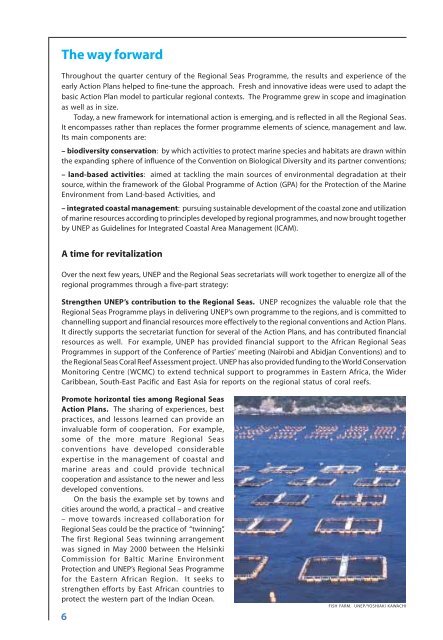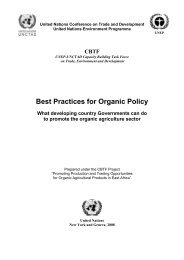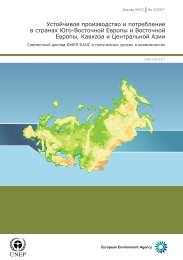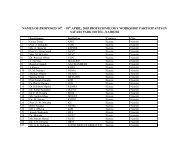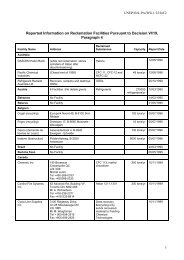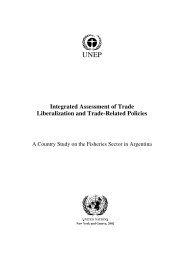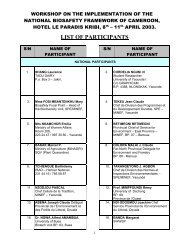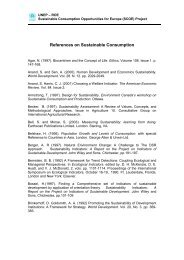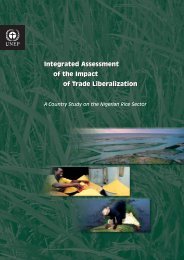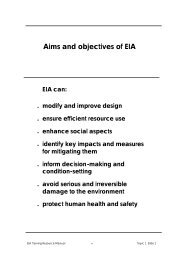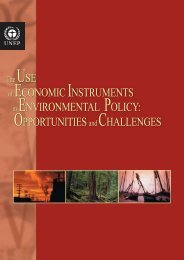Regional Seas: Strategies for sustainable development - UNEP
Regional Seas: Strategies for sustainable development - UNEP
Regional Seas: Strategies for sustainable development - UNEP
Create successful ePaper yourself
Turn your PDF publications into a flip-book with our unique Google optimized e-Paper software.
The way <strong>for</strong>ward<br />
Throughout the quarter century of the <strong>Regional</strong> <strong>Seas</strong> Programme, the results and experience of the<br />
early Action Plans helped to fine-tune the approach. Fresh and innovative ideas were used to adapt the<br />
basic Action Plan model to particular regional contexts. The Programme grew in scope and imagination<br />
as well as in size.<br />
Today, a new framework <strong>for</strong> international action is emerging, and is reflected in all the <strong>Regional</strong> <strong>Seas</strong>.<br />
It encompasses rather than replaces the <strong>for</strong>mer programme elements of science, management and law.<br />
Its main components are:<br />
– biodiversity conservation: by which activities to protect marine species and habitats are drawn within<br />
the expanding sphere of influence of the Convention on Biological Diversity and its partner conventions;<br />
– land-based activities: aimed at tackling the main sources of environmental degradation at their<br />
source, within the framework of the Global Programme of Action (GPA) <strong>for</strong> the Protection of the Marine<br />
Environment from Land-based Activities, and<br />
– integrated coastal management: pursuing <strong>sustainable</strong> <strong>development</strong> of the coastal zone and utilization<br />
of marine resources according to principles developed by regional programmes, and now brought together<br />
by <strong>UNEP</strong> as Guidelines <strong>for</strong> Integrated Coastal Area Management (ICAM).<br />
A time <strong>for</strong> revitalization<br />
Over the next few years, <strong>UNEP</strong> and the <strong>Regional</strong> <strong>Seas</strong> secretariats will work together to energize all of the<br />
regional programmes through a five-part strategy:<br />
Strengthen <strong>UNEP</strong>’s contribution to the <strong>Regional</strong> <strong>Seas</strong>. <strong>UNEP</strong> recognizes the valuable role that the<br />
<strong>Regional</strong> <strong>Seas</strong> Programme plays in delivering <strong>UNEP</strong>’s own programme to the regions, and is committed to<br />
channelling support and financial resources more effectively to the regional conventions and Action Plans.<br />
It directly supports the secretariat function <strong>for</strong> several of the Action Plans, and has contributed financial<br />
resources as well. For example, <strong>UNEP</strong> has provided financial support to the African <strong>Regional</strong> <strong>Seas</strong><br />
Programmes in support of the Conference of Parties’ meeting (Nairobi and Abidjan Conventions) and to<br />
the <strong>Regional</strong> <strong>Seas</strong> Coral Reef Assessment project. <strong>UNEP</strong> has also provided funding to the World Conservation<br />
Monitoring Centre (WCMC) to extend technical support to programmes in Eastern Africa, the Wider<br />
Caribbean, South-East Pacific and East Asia <strong>for</strong> reports on the regional status of coral reefs.<br />
Promote horizontal ties among <strong>Regional</strong> <strong>Seas</strong><br />
Action Plans. The sharing of experiences, best<br />
practices, and lessons learned can provide an<br />
invaluable <strong>for</strong>m of cooperation. For example,<br />
some of the more mature <strong>Regional</strong> <strong>Seas</strong><br />
conventions have developed considerable<br />
expertise in the management of coastal and<br />
marine areas and could provide technical<br />
cooperation and assistance to the newer and less<br />
developed conventions.<br />
On the basis the example set by towns and<br />
cities around the world, a practical – and creative<br />
– move towards increased collaboration <strong>for</strong><br />
<strong>Regional</strong> <strong>Seas</strong> could be the practice of “twinning”.<br />
The first <strong>Regional</strong> <strong>Seas</strong> twinning arrangement<br />
was signed in May 2000 between the Helsinki<br />
Commission <strong>for</strong> Baltic Marine Environment<br />
Protection and <strong>UNEP</strong>’s <strong>Regional</strong> <strong>Seas</strong> Programme<br />
<strong>for</strong> the Eastern African Region. It seeks to<br />
strengthen ef<strong>for</strong>ts by East African countries to<br />
protect the western part of the Indian Ocean.<br />
6<br />
FISH FARM. <strong>UNEP</strong>/YOSHIAKI KAWACHI


